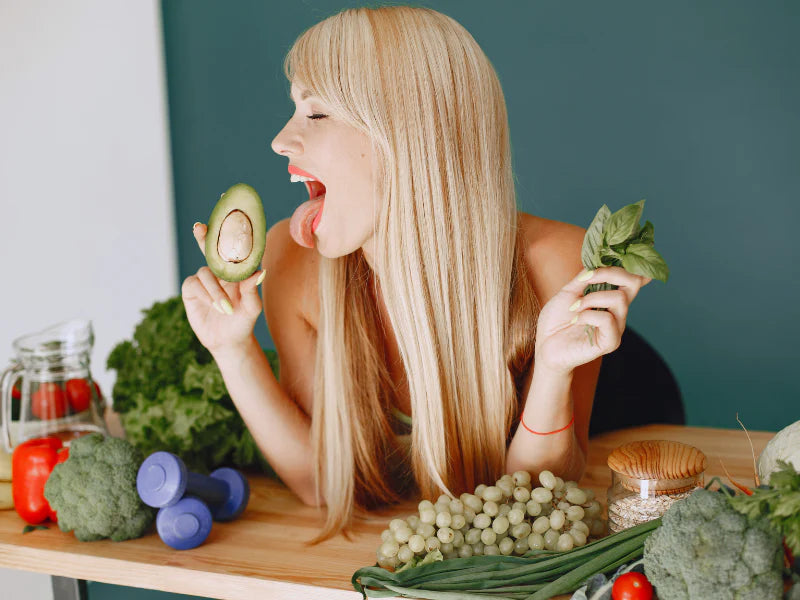
The Role of Nutrition in Anti-Aging: Nourish Your Skin From Within
Aging gracefully isn't just about skincare products. Increasing scientific research shows that what we eat plays a vital role in the aging process—especially when it comes to our skin. In this in-depth article, we’ll explore how a targeted diet can become your best anti-aging ally, nourishing your skin from the inside out.
Table of Contents
-
Introduction: The Link Between Nutrition and Aging
-
Mechanisms Behind Skin Aging
-
Essential Nutrients for Youthful Skin
-
Anti-Aging Superfoods
-
The Importance of Hydration
-
Foods to Avoid
-
Sample Anti-Aging Menu
-
Supplements: Necessity or Hype?
-
Lifestyle and Nutritional Synergy
-
Conclusion & Practical Tips
1. Introduction: The Link Between Nutrition and Aging
Aging is a natural process that affects the whole body—but our skin, the body's largest organ, shows it most visibly. Recent studies in "nutricosmetics"—the science of nutrition for beauty—show that our diet directly influences skin health and appearance.
Skin constantly renews itself, and this process relies on specific nutrients. A well-balanced diet rich in key compounds can significantly slow visible signs of aging while improving elasticity, hydration, and radiance.
2. Mechanisms Behind Skin Aging
Intrinsic vs. Extrinsic Aging
Skin aging occurs through two distinct processes:
-
Intrinsic aging: genetically programmed
-
Extrinsic aging: triggered by environmental factors
Diet primarily impacts extrinsic aging by:
-
Combating oxidative stress
-
Supporting collagen production
-
Regulating inflammation
-
Protecting against UV damage
The Role of Free Radicals
Free radicals—generated naturally in the body and amplified by environmental stress—are a leading cause of skin aging. A diet rich in antioxidants helps neutralize these harmful molecules and prevent their damaging effects.
3. Essential Nutrients for Youthful Skin
Antioxidants
Vitamin C
Key for:
-
Collagen synthesis
-
UV protection
-
Evening out skin tone
-
Wound healing
Top sources: citrus fruits, kiwi, berries, bell peppers, broccoli
Vitamin E
Contributes to:
-
Protecting cell membranes
-
Maintaining skin hydration
-
Reducing inflammation
Top sources: plant oils, nuts, avocados, seeds
Vitamin A & Beta-Carotene
Vital for:
-
Cell renewal
-
Collagen production
-
Natural sun protection
Top sources: carrots, sweet potatoes, spinach, mango, apricots
Essential Fatty Acids
Omega-3s
Support:
-
Skin barrier integrity
-
Inflammation control
-
UV protection
-
Long-lasting hydration
Top sources: fatty fish, chia seeds, flaxseeds, walnuts
Omega-6s
In balanced amounts, aid:
-
Skin structure
-
Healing
-
Hydration
Top sources: borage oil, evening primrose oil, sunflower oil
Proteins
Crucial for:
-
Collagen and elastin synthesis
-
Cell regeneration
-
Tissue repair
Top sources: fish, lean meats, eggs, legumes, tofu, soy products
4. Anti-Aging Superfoods
Berries (blueberries, strawberries, raspberries, goji):
-
Rich in antioxidants, vitamin C, polyphenols, and anthocyanins
-
Protect against oxidative stress, UV damage, inflammation, and loss of elasticity
Green Tea
-
Contains catechins, potent antioxidants that defend against UV damage, reduce inflammation, boost hydration, and slow cellular aging
Cruciferous Vegetables (broccoli, cabbage, cauliflower):
-
Packed with sulforaphane, vitamins, and antioxidant minerals
-
Help detoxify, protect cells, and maintain skin elasticity
5. The Importance of Hydration
Water and Skin Hydration
Essential for:
-
Skin elasticity
-
Toxin elimination
-
Optimal cell function
-
Preventing dehydration-related fine lines
Recommendations:
-
Drink 1.5 to 2 liters of water daily
-
Choose low-mineral water
-
Sip throughout the day for consistent hydration
Hydrating Foods
-
Cucumber (96% water)
-
Watermelon (92% water)
-
Citrus fruits
-
Tomatoes
-
Lettuce
6. Foods to Avoid
Sugar
Accelerates aging through:
-
Protein glycation
-
Inflammation
-
Oxidative stress
Limit:
-
Sweets
-
Sodas
-
Pastries
-
Processed foods
Saturated and Trans Fats
Can:
-
Increase inflammation
-
Worsen skin texture
-
Trigger breakouts
-
Accelerate aging
Avoid:
-
Fried foods
-
Pastries
-
Processed snacks and meals
Alcohol
Negatively impacts the skin by:
-
Dehydrating the body
-
Dilating blood vessels
-
Disrupting sleep
-
Impairing nutrient absorption
7. Sample Anti-Aging Menu
Breakfast
-
Option 1: Berry smoothie bowl, chia seeds, almonds, rolled oats
-
Option 2: Scrambled eggs with spinach, whole-grain bread, avocado, green tea
Lunch
-
Option 1: Quinoa salad with grilled salmon, seasonal veggies, olive oil dressing
-
Option 2: Legume buddha bowl with cruciferous vegetables, sprouted seeds, tahini sauce
Dinner
-
Option 1: Green vegetable soup, white fish, sweet potato, canola oil
-
Option 2: Tofu stir-fry with colorful vegetables, brown rice, ginger sauce
Healthy Snacks
-
Fresh fruits, a handful of nuts and seeds, berries, green smoothies
8. Supplements: Necessity or Hype?
When to Supplement Consider supplements if you experience:
-
Deficiencies
-
Restrictive diets
-
Intense stress
-
High sun exposure
Most Relevant Supplements
-
Marine collagen
-
Hyaluronic acid
-
Coenzyme Q10
-
Zinc and selenium
Tips & Precautions
-
Consult a healthcare professional first
-
Choose high-quality products
-
Follow recommended doses
-
Prioritize bioavailable forms
9. Lifestyle and Nutritional Synergy
Sleep
Vital for:
-
Cellular repair
-
Collagen synthesis
-
Detoxification
-
Hormonal balance
Physical Activity
Supports:
-
Circulation
-
Tissue oxygenation
-
Stress reduction
-
Detox processes
Stress Management
Chronic stress accelerates aging through:
-
Elevated cortisol
-
Inflammation
-
Sleep disruption
-
Impaired nutrient absorption
Techniques: meditation, yoga, deep breathing, relaxing activities
10. Conclusion & Practical Tips
Anti-aging nutrition isn’t just a trend—it’s a science-backed approach to preserving youthful, healthy skin. By embracing a nutrient-rich diet and avoiding pro-aging foods, we can significantly influence how our skin ages.
Key pillars of glowing, youthful skin:
-
A balanced, nutrient-dense diet
-
Proper hydration
-
A healthy lifestyle
-
Effective stress management
-
Restorative sleep
Aging is natural—we’re not fighting it, but rather learning to age gracefully and mindfully. With the right nutrition and a positive mindset, your skin can remain radiant and resilient for years to come.
Practical Tips to Get Started
-
Gradually introduce anti-aging superfoods into your diet
-
Increase your intake of colorful fruits and vegetables
-
Choose healthy fats over processed ones
-
Cut back on sugar and processed foods
-
Stay well hydrated throughout the day
Anti-aging nutrition isn’t about restriction—it’s about nourishment, balance, and sustainable beauty from within.
